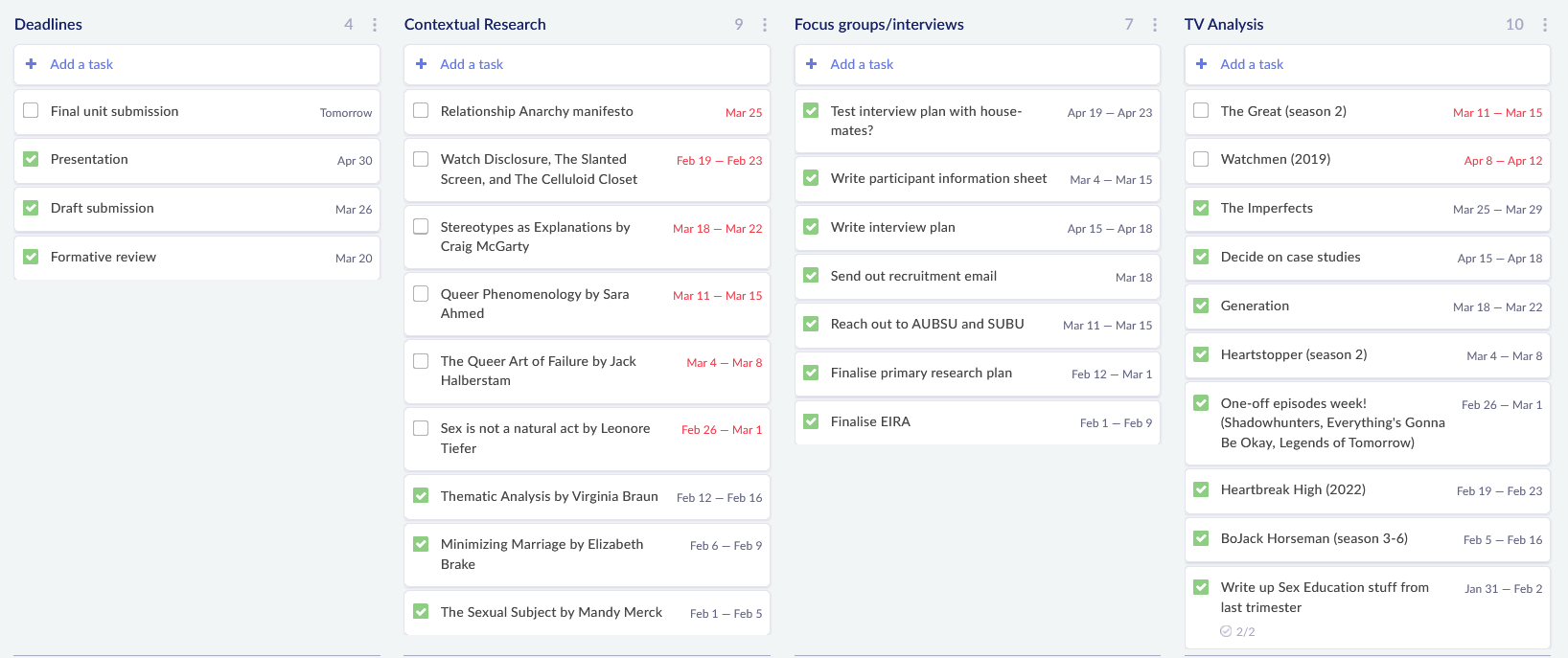My project will be tackling the research question “How do societal attitudes impact depictions of asexuality and aromanticism in TV?” I believe this research is necessary due to the lack of discussion of the asexual and aromantic spectrums in academia. These groups and their experiences are highly underrepresented in both popular media and in academia, and I believe it is important to bring these perspectives into the light. By understanding asexual and aromantic perspectives, we can gain a more complete understanding of issues such as consent, hypersexualisation, desexualisation, race, gender, and disability.
My goals with this research project are to develop a greater understanding of asexual and aromantic experiences, as well as a greater understanding of media ideology and how it relates to depictions of these identities. I hope to achieve this through three main objectives: identifying dominant societal beliefs about sex and relationships, analysing whether media tends to reflect or challenge these beliefs, and investigating how media impacts people’s beliefs. This will be done through a combination of textual/thematic analysis of depictions of asexuality/aromanticism, and primary research through focus groups and interviews.
So far, my research has mainly focused on attitudes to asexuality and aromanticism, and I have gained an understanding of the stereotypes and issues asexual and aromantic people face. Much of what I have read on the topic has been written by other asexual/aromantic writers, so I have looked at a range of different ace/aro perspectives. I have also done broader research into feminist and queer media studies, and by doing so identified the gap in the literature with regards to asexuality and aromanticism. I have also begun my investigation into TV shows that depict asexual and aromantic characters, and identified some possible case studies. Through my research I have also narrowed down my research question and identified the research methods I will be using.
My next steps will be putting my research methods into action. I will be watching more of the TV shows/episodes that depict asexual/aromantic characters and identifying which ones to use for case studies. I will then use textual analysis methods to analyse these case studies in depth. I also aim to perform a more general content analysis of a wider range of shows, identifying common patterns in asexual and aromantic characters. I will also need to make any necessary edits to my ethics proposal for the interviews and focus groups, and then develop a finalised plan for this primary research.
There are many potential obstacles I will face in this research, particularly when it comes to the primary research. Firstly, there is the issue of potentially needing to alter my ethics proposal, if any issues are identified by the ethics team. Another notable obstacle is the potential difficulty in recruiting participants, as many people may be reluctant to speak about a sensitive topic like sexuality. I may need to greatly reduce the intended numbers of participants I am aiming for, based on how many people are willing to sign up.
Most of the resources I will need will be for the interviews and focus groups. First, I will need to obtain permission to carry out the interviews and focus groups. Once I’ve obtained permission, I will need to write up an interview plan so I will know what questions to ask and a participant information sheet, so that I can provide potential participants with all the key information. I will obviously need participants for the interviews and focus groups, and I will need to book out a room to conduct the focus groups/interviews in. Due to the screening aspect of the focus groups, this will need to be a room with some kind of big screen, such as one of the small lecture theatres. Finally, I will need to select case studies for the screening before it takes place.
Another important resource I will need is recording equipment. I already own my own microphone but I will need to test it out to check that it will be appropriate for recording multiple people at once. If it is not, then I will need to obtain a higher quality microphone.
Time plan for this unit is below. You may notice that with the benefit of hindsight, I did not do a lot of what I said I would. In research, it's important to be adaptable!

